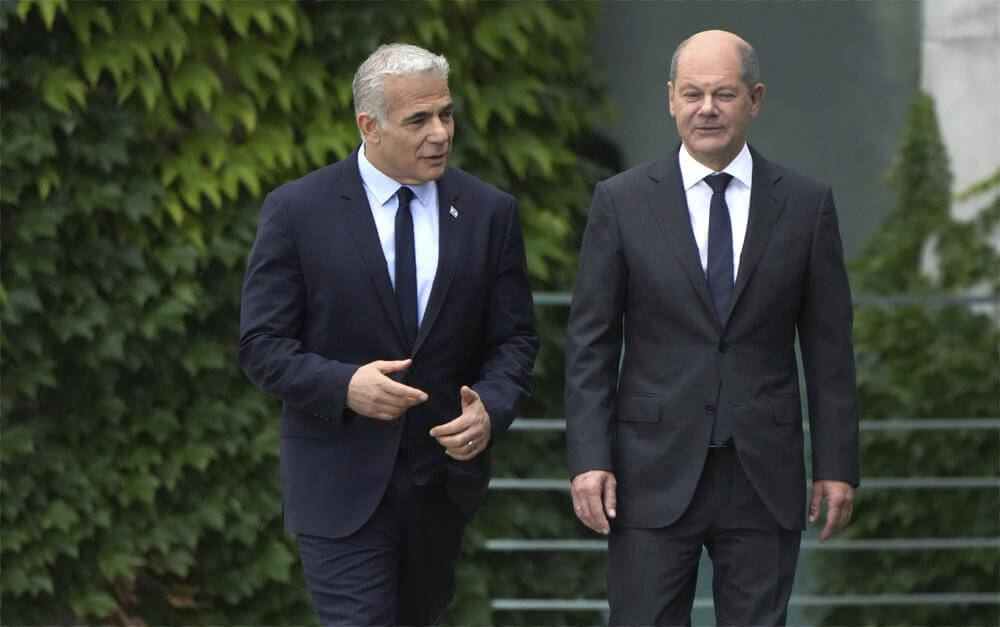German Chancellor Olaf Scholz on Monday reassured Israeli Prime Minister Yair Lapid that a nuclear deal with Iran is not imminent but asserted that an agreement with Iran is the right way forward, as it would ensure limits on Tehran’s nuclear programme.
During a joint press conference with Lapid in Berlin, Scholz said there is no reason for Iran not to sign a deal with world powers. He argued that an agreement would provide Iran with much-needed sanctions relief and allow the world to keep an eye on the Islamic Republic’s nuclear activities.
“We remain patient, but we also remain clear: Iran must be prevented from being able to deploy nuclear weapons,” the German leader remarked. Scholz reaffirmed that “a functioning international agreement to limit and monitor the Iranian nuclear program is the right way” to prevent Iran from advancing its nuclear programme.
ביקורך בברלין, @yairlapid היקר, מעמיק את מערכת היחסים הקרובה והידידותית בינינו. אני אסיר תודה על כך! היא אינה מובנת מאליה. אני נרגש מאוד מכך ששנינו נשוחח היום עם ניצולי שואה בבית ועידת ואנזה. pic.twitter.com/qCsx7XZmDA
— Bundeskanzler Olaf Scholz (@Bundeskanzler) September 12, 2022
Lapid, on the other hand, disagreed with Scholz about reviving the 2015 deal. Insisting that a nuclear deal “cannot and will not” prevent Iran from acquiring nuclear weapons, Lapid said, “It is time to move past the failed negotiations with Iran.”
He warned that “a nuclear Iran will destabilise the Middle East, and create a nuclear arms race that will endanger the entire world.” To this end, he reiterated that returning to the 2015 deal “under the current conditions” would be a “critical mistake.” “Removing sanctions and pouring hundreds of billions of dollars into Iran will bring waves of terrorism, not only to the Middle East, but also across Europe,” Lapid said.
Keeping this in mind, the Israeli PM said stopping Iran’s nuclear programme requires a “new strategy.” For instance, he suggested that a “better way forward for the Middle East” would be the expansion of the Abraham Accords and more countries normalising ties with Israel. “Our hand is outstretched for peace, with all our neighbours. And it always will be,” he noted.
First among these shared challenges is the Iranian threat.
— יאיר לפיד - Yair Lapid (@yairlapid) September 12, 2022
A nuclear Iran will destabilize the region and create a nuclear arms race that will endanger the whole world.
It’s time to move past the failed negotiations with Iran. We need a new strategy to stop its nuclear program. pic.twitter.com/fyXjwNzxg0
Lapid’s visit to Germany forms part of Israel’s wider effort to lobby European countries and the United States (US) against signing a nuclear deal with Iran. Last month, Lapid warned the West against signing a nuclear deal with Iran amid reports that an agreement between Tehran and world powers was imminent. He claimed that the deal on the table right now was bad and would give Iran an additional $100 billion a year following the removal of sanctions.
Israel has for years warned that Iran is building a nuclear weapon and could launch airstrikes against Iran’s nuclear facilities to prevent a nuclear Iran. It views a nuclear Iran as an existential threat due to repeated threats by Iranian leaders to “annihilate” Israel.
In fact, on Monday, the Iranian military said it developed an advanced long-range suicide drone capable of targeting Israeli cities like Tel Aviv and Haifa.
Chancellor Olaf Scholz has announced that Germany will draw on Israel's help to bolster its air defense force.
— DW Politics (@dw_politics) September 12, 2022
Israeli Prime Minister Yair Lapid described the military partnership as "proof that we have drawn the necessary conclusions from the past." pic.twitter.com/rJj6G17iCT
Iran, however, insists that its nuclear programme is peaceful and meant for scientific purposes.
Apart from the talks on the deal, Scholz and Lapid discussed improving defence and security ties. According to a report by Bloomberg, Scholz has agreed to purchase Israel’s Arrow 3 ballistic missile defence system instead of the US THAAD air defence system. Following Russia’s invasion of Ukraine on February 24, Germany set up a $101 billion fund to modernise its defence forces.

